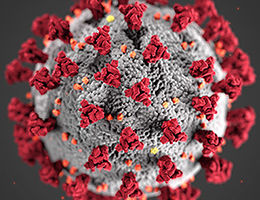
On this page, you'll learn more about coronavirus and the disease it causes, known as COVID-19. You'll also find links to more COVID-19 information.
Coronavirus 2019 - Condition Information
What is coronavirus disease 2019 (COVID-19)?
Coronavirus Disease 2019 (COVID-19) is a respiratory illness. It's caused by a coronavirus called 2019 novel coronavirus (2019-nCoV).
Some things to know about coronavirus:
- There are many types of coronaviruses; COVID-19 is the strain discovered in 2019.
- Coronaviruses are a common cause of bronchitis; sometimes, they cause pneumonia.
- Symptoms can range from mild to severe respiratory illness.
- These viruses are also found in some animals.

What are the symptoms of COVID-19?
The symptoms of COVID-19 can be similar to other health conditions, and may appear two to 14 days after infection. Common symptoms include:
- Fever
- Coughing
- Shortness of breath
If you have these symptoms or others identified by the CDC, contact your provider. If you are experiencing the following severe symptoms, please visit the emergency room or call 911:
- Trouble breathing
- Persistent pain or pressure in the chest
- New confusion
- Inability to wake or stay awake
- Pale, gray, or blue-colored skin, lips, or nail beds, depending on skin tone
How does COVID-19 testing and treatment work?
COVID-19 infection can be detected using a viral test and treated using specific antiviral medicines. Testing and treatment services are widely available, and Loma Linda University Health offers both as a Test-to-Treat center. Learn about our testing and treatment services, when to get treated, and more.
If your viral test is positive for COVID-19, you should:
- Isolate from others according to CDC guidelines while you have a fever and/or other symptoms that are not improving. You can go back to your normal activities (with added precautions) when both of the following are true for at least 24 hours:
- Your symptoms are getting better overall
- You have not had a fever (and are not using fever-reducing medication)
- Monitor your symptoms and consider speaking with your healthcare provider to see if COVID-19 treatments are a good option for you. Only your doctor can help you decide which treatments are right for you, including drugs like Veklury (remdesivir) and Paxlovid (nirmatrelvir). Do not attempt to treat COVID-19 using anything the FDA has not authorized as a COVID-19 treatment option.
- Take steps to protect others, like masking and informing people who you may have exposed to the virus.
Most people recover from COVID-19 with normal sick care at home in about two weeks. If your symptoms get worse during that time and you become concerned, contact your provider immediately. Some people experience more serious illness from COVID-19 and may need to go to the hospital for treatment and recovery.
If your viral test is negative for COVID-19, the test did not detect the virus. However, a negative test does not mean that you are definitely not infected. Visit the CDC's testing page to learn what to do if your test was negative but you have symptoms or were exposed to someone with COVID-19.
A viral test for COVID-19 isn't the same as an antibody test. You may have a positive antibody test if your body has already fought off COVID-19 or if you've received a vaccine. Even if you have COVID-19 antibodies, you can be infected again. While the risk is low for at least six months after you're infected, you should continue to practice all preventive measures.
What are possible complications of COVID-19?
COVID-19 can cause a wide range of conditions in your body, from difficulty breathing to confusion to body rashes. The severity of your illness can vary greatly, as can the time it takes to fully recover. For some people, COVID-19 is deadly. Learn more about conditions caused by COVID-19 on the CDC's website.
What can I do to prevent COVID-19?
One of the most effective ways to prevent serious illness from COVID-19 is vaccination — learn about vaccines and appointments.
To help prevent the spread of COVID-19, you should:
- Wash your hands often for at least 20 seconds, or use an alcohol-based hand sanitizer.
- Wear a mask that fully covers your mouth and nose.
- Avoid visiting crowded public areas when possible.
- Aviod touching your eyes, nose, or mouth.
- Cover coughs and sneezes.
- Avoid contact with people who are sick.
- Clean surfaces often with disinfectant.
Next Steps
Follow prevention advice. Follow steps for preventing the spread of COVID-19 (PDF), including handwashing and avoiding contact with sick people.
Get tested and treated. If you have symptoms and are at greater risk of serious illness, you should get tested and, if positive, get treated. Learn about testing and treatment.
Call your provider with concerns. If you have symptoms, call your provider or send a message through MyChart to discuss what to do next.
Follow instructions closely. If you are diagnosed, follow the instructions of healthcare staff closely to improve your recovery and reduce the risk of spreading the virus to others.

